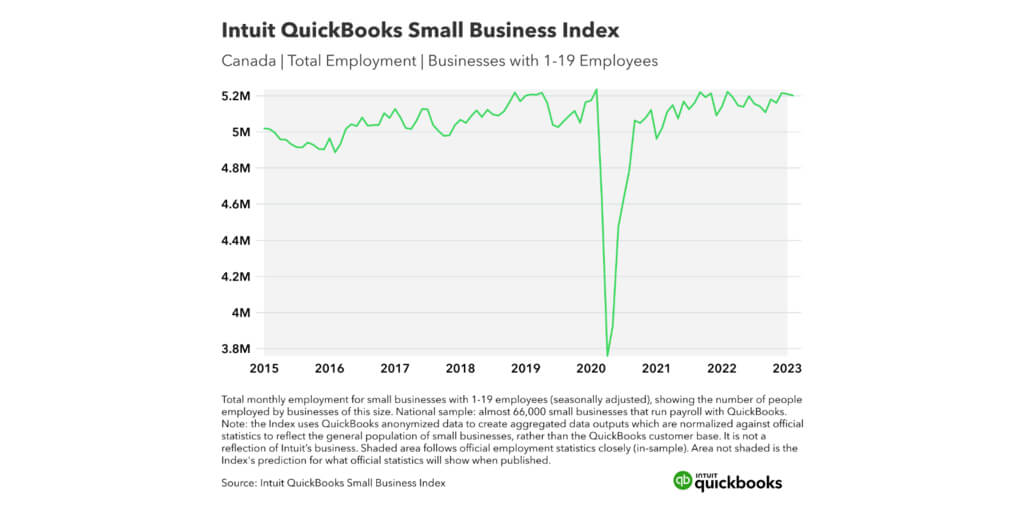Intuit, the company behind software like TurboTax, Credit Karma, QuickBooks, and Mailchimp, has launched Intuit QuickBooks Small Business Index, a new monthly indicator of employment and hiring among small businesses in Canada, the U.S., and the UK.
Developed in collaboration with global economist Professor Ufuk Akcigit, the Intuit QuickBooks Small Business Index uses economic models to normalize anonymized QuickBooks customer data against official government statistics to reflect the general population of small businesses in each country. This methodology helps Intuit more clearly delineate between its small business customers and the small business community at large, while also providing a new tool that can inform government policies that impact small businesses around the globe, as well as help small businesses make key decisions.
According to Intuit, small businesses are often underrepresented in economic data, despite being vital to the current and future health of the economy.
“Up-to-date insights like those now available through our index will be invaluable to anyone focused on the success of small businesses, especially in the face of increasingly challenging economic conditions,” says Sasan Goodarzi, Intuit’s Chief Executive Officer. “We’re excited for this unique index to become a key tool economists, policymakers, and small businesses themselves can use in making decisions that will help power small business prosperity around the world.”

The first monthly Index reveals that in February, small businesses with one to 19 employees employed 8,700 fewer people (seasonally adjusted) nationally compared to the previous month, which is a monthly decrease of 0.17 per cent. Despite the drop, Canadian small businesses with one to 19 employees still accounted for 5,201,500 jobs.
Sectors that experienced the largest decreases in employment in Canada were Finance and Real Estate (-0.43 per cent), Construction (−0.26 per cent), and Professional Services (−0.17 per cent) while employment increased in Accommodation and Food Services (2.45 per cent), Education (1.19 per cent), and Business Services (1.16 per cent).
The region that saw the most growth was Québec, growing by 0.91 per cent to 1,070,500 jobs. However, Ontario saw the largest decrease, with a drop of -0.29 per cent to 1,917,100 jobs.
“In Canada, our Intuit QuickBooks Small Business Index is a measurement of small businesses with 1-19 employees,” clarifies global economist and Arnold C. Harberger Professor of Economics at the University of Chicago Ufuk Akcigit. “The Index reveals a drop of -0.17 per cent in small business employment in February compared to January 2023. When looking back year-over-year, we see that the decline in employment has slowed in comparison to February 2022, where employment declined by -0.4 per cent. Small businesses experienced a record monthly employment drop by -21 per cent in April 2020 due to COVID-19. This monumental decline was met with a rapid recovery one year later that reached pre-COVID average employment levels in April 2021, which continued until September 2021.
“It’s encouraging,” he adds, “to see that the Intuit QuickBooks Small Business Index indicates that employment levels have remained relatively stable over the past six quarters. As small businesses continue to play a vital role in the Canadian labour market, it makes it even more important we now have a tool like the Intuit QuickBooks Small Business Index that will focus on unearthing timely insights into their overall employment health and within specific sectors and regions.”
David Marquis, Vice President and Canada Country Manager, at Intuit, adds: “Our new Intuit QuickBooks Small Business Index draws on a sizable sample, providing a prompt and precise representation of the economic health of small businesses in Canada. These critical insights can serve as a single source of truth to help facilitate a productive dialogue among small business owners and policy makers to ensure the backbone of our economy continues to thrive. The number of small businesses, the jobs they create, and the innovations they bring make them vitally important to the economy. By keeping a monthly pulse on the health of small businesses, we are able to provide rich insights to power their survival, growth and prosperity.”
New data insights will be added to the Intuit QuickBooks Small Business Index dashboard and published in regular blog posts at the earliest opportunity every month. You can subscribe and get a full list of publication dates for 2023 at the Intuit QuickBooks Small Business Index interactive hub.
In Canada, the Intuit QuickBooks Small Business Index shows the number of people employed by small businesses with 1-19 employees in the previous month and how that number has changed since the month before. These data insights are available at the national, regional, and sector levels; based on a total sample of almost 66,000 businesses. Typically, the Index will be published several days before Statistics Canada’s Labour Force Survey is released.
In the U.S., the Index shows the number of people employed by small businesses with 1-9 employees in the previous month and how that number has changed since the month before. These data insights are available at the national, regional, state (when sample sizes are sufficient), and sector levels; based on a total sample of almost 333,000 businesses. Because the Index is powered by anonymized data from QuickBooks Online Payroll, its data insights are available up to nine months earlier than equivalent official statistics, giving a more up-to-date picture of small business employment.
In the UK, the Intuit QuickBooks Small Business Index shows the number of job vacancies at small businesses with 1-9 employees in the previous month and how that number has changed since the month before. These data insights are available at the national (UK), country (England, Wales, Scotland, Northern Ireland), and sector levels; based on a total sample of almost 25,000 businesses. Typically, the Index will be published around two weeks before the Office for National Statistics’ monthly Vacancy Survey is released.
The Index methodology involves a sample of anonymized QuickBooks Online Payroll records that are aggregated and normalized against official government statistics before publication using purpose-built economic models created by Professor Akcigit and his international team of independent economists. This means the Index can provide a near real-time reflection of hiring and employment in the broader small business economy — rather than the QuickBooks customer base — just a few days after small businesses run payroll.








